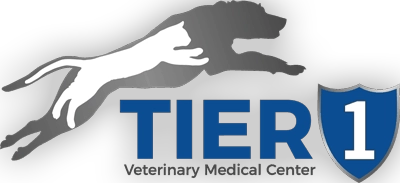How Do I, As the Pet Owner, Recognize Dental Concerns?
I’m Doctor Sean McPeck, CEO, owner of Tier 1 Veterinary Medical Center. It’s kind of a wide variety of ways to go about doing this, but the biggest one is looking for abnormalities inside the mouth. Having that constant view of your dog’s mouth by brushing the teeth daily is going to be a great way to recognize when something is abnormal because you’re seeing what is normal.
So what is abnormal? Abnormal is going to be fractured teeth, missing teeth, inflammation, whether that’s gingivitis or do we have a foreign object in the in the mouth? A growth? When we look at the face, do we have bilateral symmetry or is one side looking different than the other? And ways that will manifest that is what we call an abscess.
If we get a tooth-root abscess due to an exposed pulp cavity that has gone unrecognized, that tooth needed to be pulled or need a root canal. Whether we’ve got some type of slab fracture on the tooth and now bacteria from the mouth is going down to the apex of the tooth, the root that’s in there and it creates an abscess. And so you’ll get swelling.
Whether you’ll get swelling of the face and then if it burst through in the nasal cavity, you can get unilateral nasal discharge. We could get an abscess going up behind the eyeball and the eyeball protruding forward, which is called a A retrobulbar abscess. So those are kind of extreme examples.
But one of the first things that we can notice just by looking at the mouth is if one side is completely clean and the other side has a bunch of tartar, plaque, gingivitis on it, then what that’s telling us is that our animal is purposely avoiding chewing on one side and the clean side is getting all the abrasion from chewing the kibble and getting cleaned up. So there might be something that is painful on the one side of the mouth. So, again, visual inspection.
The other way is that you reach down to your pet and they avoid contact like it hurts, okay.? That’s a great indication that there’s something wrong in their mouth. Do they have a toy that they normally like to play with and now they’re dropping that toy or they’re avoiding putting that toy in the mouth? Watching them eat, are they avoiding eating the kibble?
Great examples, I’ve had many patients that have come in where the owner tells me the dog or cat is just sitting there staring at the water, or they start to lick the water and then they shake their head or they sit and stare and drool looking at the kibble. Well, that animal obviously knows that it’s going to be painful when they go to eat or they go to drink and so now they’re avoiding it. They want to, but they’re avoiding it. And so that’s another great indication that, hey, there’s something wrong. We need to address the teeth. We need to get them looked at.
A dental cleaning is one way that we can go about removing all of that built up bacteria and tartar and plaque and then get good X-rays of the teeth so that we know if there’s a disease process that is affecting a tooth and whether or not that tooth needs to be removed or have an advanced endodontic procedure done for a root canal or salvage procedure.
The biggest thing that I can say to the pet owner is you’ve got to be proactive with your pet’s dental care. Whether it’s an additive into their water, whether it is a treat that helps to break down the buildup in the mouth or whether you’re manually brushing the teeth. Those are all interventional things that you can do to help prevent dental disease from developing.
But obviously getting into a veterinarian where we can do that deep scaling that deep cleaning and polishing and really evaluate the teeth is the best thing that you can do. So have that discussion with your veterinarian. When you go in for your next check, ask the veterinarian to give you advice on when that next thing should be, because not every dog is the same. Right? Just with people.
That PH balance in the saliva, the diet, the way that they eat, you know, is this animal just literally gulping down the food and not chewing at all? Or do they sit there and really chew and break down the debris that’s in the mouth? This all affects how quickly we get calculus and tartar build up and gingivitis. And that is really going to impact whether or not you need a cleaning once a year. Some crazy ones, you know, every six months. Or are you good with every couple of years?
If you found this helpful, please leave a like if you’d like more information about getting your medicine and your pets in the future. Hit that subscribe button.
